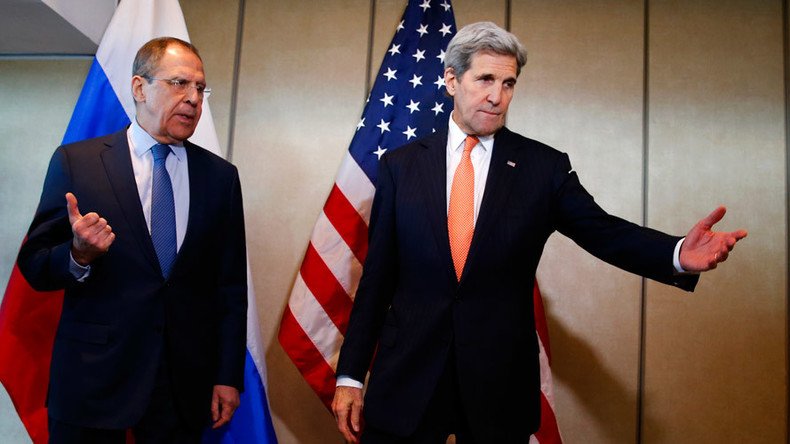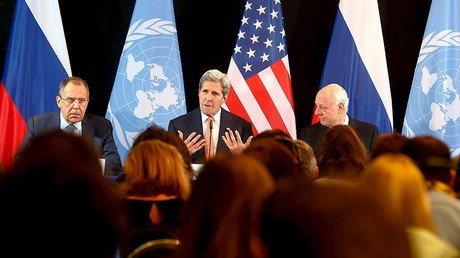‘US needs to talk turkey to Turkey, Saudis on Syria invasion’

What impact would agreements reached at the Munich talks have on the conflict in Syria and what can we expect further in the peace process? RT discussed this with experts.
A plan to end hostilities in Syria was announced after the International Syria Support Group (ISSG) meeting in Munich on February, 12. The plan stipulates verifiable results within a week, revival of the Geneva-3 peace talks and the immediate start of humanitarian aid deliveries to civilians in Syria. The US, Russia, and the UN participated in the talks.
US Secretary of State John Kerry acknowledged after the talks that the commitments agreed at Munich are only on paper and the “real test” will be whether all parties to the Syrian conflict honor their commitments.
Moscow is counting on the US and other ISSG countries to put pressure on the Syrian opposition to cooperate with the UN, Russian Foreign Minister Sergey Lavrov told the media after the meeting.
According to former CIA officer Ray McGovern it’s good news that Russia and the US are cooperating on finding a solution to the Syrian crisis, but the bad news is that some US allies in the region seem to be out of its control, he told RT.
“The good news is that presidents Putin and Obama have given very clear directions to their foreign secretary and secretary of state to get their act together and exert joint US-Russian influence on the scenario in Syria,” said McGovern.
He cited as an example an agreement reached between Russia and the US in 2014 on the elimination of Syrian chemical weapons. This, as Lavrov said at a media conference in Munich, was one of the major achievements of the last year - the destruction of all those chemical weapons and the prevention of an overt war against Syria by the US. “So, when they get clear directions they could do these things,” McGovern said.
“When Putin told Obama: “We don’t really think you are doing a very good job in Syria, we are going to send our own planes to finish ISIS off, “what Obama did to his credit was saying: “Ok, let’s get our foreign secretary and the secretary of state together to de-conflict things so we don’t run into each other,” McGovern continued.
Considering the current situation “where it has gone beyond deconfliction to cooperation” as a positive signal, McGovern argues that “the bad news is that the US does not control Saudi Arabia, Qatar, or even Turkey the way the US controls Western or Eastern Europe”.
“What the US needs to do is, as we say in America, ‘talk turkey‘ to Turkey and tell them to knock it off, don’t even think about invading Syria. And they need to ‘talk turkey’ to Saudi Arabia as well”, he added.
McGovern said that "it is going to take some guts, because there is a hundred billion in terms of arm sales pending from the US to Saudi Arabia. Obama is going to have to step up to the arms merchants and make it happen.”
‘Russia & US could stand guard against Saudi expansionism’
Karen Kwiatkowski, retired US Air force Lieutenant Colonel, said that it is hard to say yet what impact the new agreements would have on the conflict in Syria, adding that all sides to the conflict should be involved in the negotiations.
Currently, the ISSG “don’t have the involvement of some of the guys on the ground in Syria that are fighting,” while their cooperation is important for the implementation of the agreements.
She assessed positively that “the Russians and the Americans are talking” and, also said that it is a good thing that humanitarian aid will be flowing in. However, Kwiatkowski went on, “very often what we see with these things is that humanitarian aid simply becomes one more part of the conflict. It is very difficult to end civil wars from the outside.”
“I think it shows that both sides realized that the civil wars are way more harmful that it is serviceable to some of the interests of the US or Russia and the interests of the neighbors there,” she said.
As it seems that “they are responding to some extent to Saudi Arabia’s apparent interest in getting more involved in the ground war there,” she suggests “together Russia and the US will be able to stand guard against Saudi expansionism.”
Commenting on the development in peace process, Kwiatkowski argues that the people in Syria, both the opposition to the government and the government itself, and citizens need to be involved in the process because “if they are not, if they are considered only to be pawns in a great game of negotiations outside, it is not going to be effective.”
“So, somehow, both Russia and the US, the leaders of the negotiations, are going to step down and be a little more humble and start recognizing that the Syrians own their own country and they have to be involved. If the Kurds who live within Syrian borders are part of this - they have to be involved,” she added.
‘Cessation of hostilities’ vs. ‘ceasefire’
Larry Johnson, retired CIA intelligence officer and State Department official, says the agreement on the cessation of hostilities “is decidedly in favor of Russia’s position as opposed to the US position.”
“It requires the groups that are going to receive the aid to agree to not continue combat,” he told RT. “That almost automatically eliminates groups like Al-Nusra and ISIS. Isolating them is important in dealing with the real source of the violence in the area.”
In Johnson’s view, however, “it is unfortunate that the Kurds were basically abandoned by the US in this agreement catering to Turkey.”
“All alone, Turkey has really been one of the provocateurs in this entire war,” he said.
He added though that the plan agreed upon during the Munich talks “shows that the effort that Russia made in turning the tide on behalf of the government of Bashar Assad is beginning to pay dividends.”
Commenting on the difference between the terms "cessation of hostilities" and "ceasefire", Johnson said that “the cessation of hostilities basically will be measured by an aid convoy going into an area without being fired at.”
“And it is expected those rebel groups that occupy those areas not shoot. If they do shoot then that will give the…the forces delivering that material the right to shoot back. So, it is not an official ceasefire and part of the reason for that there is no one single voice of the rebel side,” he said.
Richard Becker of the anti-war Answer Coalition, speaking on the obstacles to a solution to the Syrian crisis, said “It is very difficult to resolve a civil war that has massive outside intervention seeking to overthrow the government.”
“You can see that different NATO forces were at different sides in that battle. And Turkey which has played a key role in the intervention really sees the Kurdish forces which have been really fighting ISIS as their main enemy. So, that is just one example of the many contradictions that exist between the different powers that are involved in this war in Syria,” he said.
The statements, views and opinions expressed in this column are solely those of the author and do not necessarily represent those of RT.













